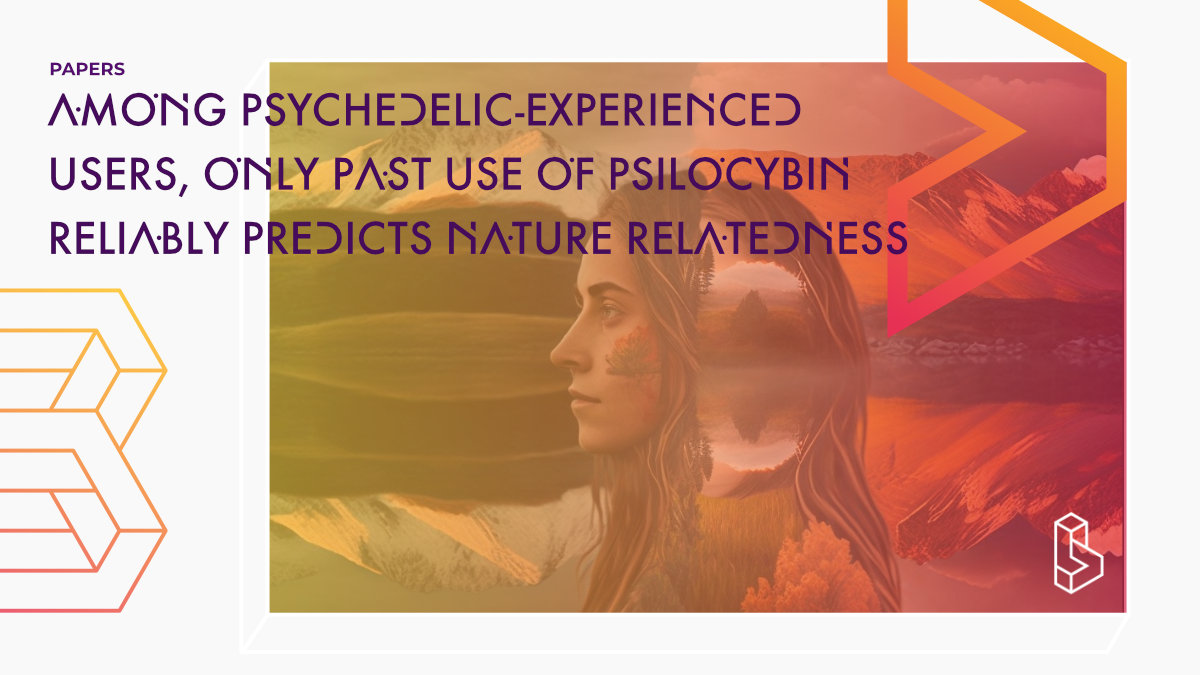This reanalysis of survey data (n=3817) finds that nature-relatedness (NR) is only predicted by past use of psilocybin. As the surveys are observations, the question is still out if the pharmacology or the way people use different psychedelics (setting) is driving this result.
Abstract
“Background: Past research reports a positive relationship between experience with classic serotonergic psychedelics and nature relatedness (NR). However, these studies typically do not distinguish between different psychedelic compounds, which have a unique psychopharmacology and may be used in specific contexts and with different intentions. Likewise, it is not clear whether these findings can be attributed to substance use per se or unrelated variables that differentiate psychedelic users from nonusers.
Aims: The present study was designed to determine the relative degree to which lifetime experience with different psychedelic substances is predictive of self-reported NR among psychedelic-experienced users.
Methods: We conducted a combined reanalysis of five independent datasets (N = 3817). Using standard and regularized regression analyses, we tested the relationship between degree of experience with various psychedelic substances (binary and continuous) and NR, both within a subsample of psychedelic-experienced participants as well as the complete sample including psychedelic-naïve participants.
Results/Outcomes: Among people experienced with psychedelics, only past use of psilocybin (versus LSD, mescaline, Salvia divinorum, ketamine, and ibogaine) was a reliable predictor of NR and its subdimensions. Weaker, less reliable results were obtained for the pharmacologically similar N,N-dimethyltryptamine (DMT). Results replicate when including psychedelic-naïve participants. In addition, among people exclusively experienced with psilocybin, use frequency positively predicted NR.
Conclusions/Interpretation: Results suggest that experience with psilocybin is the only reliable (and strongest) predictor of NR. Future research should focus on psilocybin when investigating effects of psychedelic on NR and determine whether pharmacological attributes or differences in user expectations/use settings are responsible for this observation.“
Authors: Matthias Forstmann, Hannes S. Kettner, Christina Sagioglou, Alexander Irvine, Sam Gandy, Robin L. Carhart-Harris & David Luke
Summary of Among psychedelic-experienced users, only past use of psilocybin reliably predicts nature relatedness
Researchers from multiple disciplines strongly emphasized the need to understand the cognitive and affective processes involved in pro-environmental behaviour, and how to promote behaviour change toward sustainability and conservation in the general population.
Recent research found that past use of classic, serotonergic psychedelics positively predicts people’s sense of connectedness with the natural environment, and thereby, self-reported pro-environmental behaviour. However, most studies suffer from a list of shortcomings, and the present research addresses some of these concerns.
Study details
Participants
3817
Humans
Linked Research Papers
Notable research papers that build on or are influenced by this paper
Lifetime experience with (classic) psychedelics predicts pro-environmental behavior through an increase in nature relatednessThis survey study (n=1487) probed the association between experience with classic psychedelic substances and pro-environmental behavior using structural equation modeling. The conclusion found that the lifetime experience with psychedelics may indeed be a factor in people’s pro-environmental behavior by altering their self-construal in terms of an incorporation of the natural world, regardless of core personality traits or general proclivity to use mind-altering substances. This indicates the potentially positive effects on a societal level and also supports the beneficial effects of psychedelic use on mental health.
From Egoism to Ecoism: Psychedelics Increase Nature Relatedness in a State-Mediated and Context-Dependent Manner
A prospective survey study (n=654) established a (weak to moderate) causal link between the use of psychedelics and nature-relatedness. This was mediated by the extent of ego-death and perceived relatedness to nature during the psychedelic experience. This paper argues that psychedelics may bring us closer to nature and that this might be a possible positive outcome that restores mental health, or at least is correlated with this.

